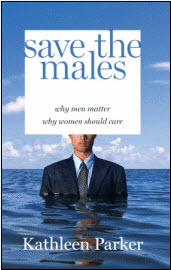|
|
|
With humor and common sense, Kathleen Parker tours one front in the gender wars after another, showing how each one affects our sons and daughters. The question of women in combat, the "goddess" movement, and such feminist rituals as the Vagina Monologues all come under Parker's fire, but she most strongly attacks the marginalization of fatherhood. Men, masculinity, husbands, and fathers have been under seige by the feminists for the last several decades. "Interestingly, we seem to accept that children shouldn't be raised without mothers," writes Parker, Parker examines the growing phenomenon of intentional single motherhood. Many of these women are experiencing the fallout from feminism's "have-it-all" mentality. Led to believe they could postpone motherhood indefinitely, they now find themselves single and nearing the end of their fertility. Parker sympathizes with these women, but utterly rejects the idea that "the core of the family is mother and child and that men are, in a word, obsolete." When men are not forcibly expelled from the family through divorce and custody battles, or through intentional single motherhood, they are often feminized: traditional male roles are taboo for modern men. Even popular magazines push the idea that men and women must share household work exactly evenly. If anything, men should do more housework and child care just to prove they aren't "masculine types." Neither men nor women benefit when feminists reduce everything to an issue of gender. Men and women are interdependent, and we don't serve our daughters well by creating a society that disregards or emasculates our sons. Ms. Parker concludes with a plea: "We need women willing to let men be men -- and boys be boys. ... Saving the males -- engaging their nobility and recognizing their strengths -- will ultimately benefit women and children, too." (Random House, 2008, 215 pps., $26.00) |
 "but we regard the contributions of fathers as optional seasoning, as though children are little casseroles, especially tasty with a pinch of Dad, but guests will hardly notice if you leave him out." Stronger fathers could have prevented many of the rising generation's pathologies.
"but we regard the contributions of fathers as optional seasoning, as though children are little casseroles, especially tasty with a pinch of Dad, but guests will hardly notice if you leave him out." Stronger fathers could have prevented many of the rising generation's pathologies.

